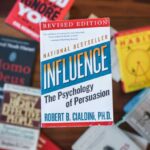As we discussed in a previous post, there is a science to getting a prospective client to say yes to your offer. According to Professor Robert Cialdini, there are six universal principles. In this post, we shall discuss the last three.
Commitment and Consistency
People like to be consistent with their self-image which is based on what they have said or did in the past.
When I wanted to write my first book I knew it would be a huge time commitment. I also knew that it would be easy to get distracted and lose focus. So, as a commitment device, I told a few friends I was writing a book. The simple act of making a public commitment to writing the book created the internal drive to deliver on what I said I would do.
As a salesperson, we can use a person’s desire be consistent to our advantage. However, getting them to make a large commitment such as buying a high ticket item from you can be difficult. To combat that, we can ask them to make a series of micro-commitments and warm them up first.
That is one reason is why so many websites, including this one, often start out by simply asking for an email, in exchange for something the person sees as valuable, at no cost to get to that first micro-commitment.
Perhaps the next micro-commitment might involve you asking them to complete a short survey that involves a little more effort on their part. Then you might ask them to sign up for a free webinar which is a much larger time commitment. With each micro-commitment, you raise the chances of the prospect seeing themselves as a customer which will make them more likely to purchase from you later on.
Liking
We all want to be liked especially if it comes from a source that you might consider to be superior to you in some way. This explains why many entrepreneurs and Hollywood stars have huge followings.
As John Jantsch discussed in his book Duct Tape Marketing, for a prospect to buy from you they have to know, like, and trust you. Today earning a prospect’s trust is often the hardest elements for a business to achieve and it starts with them liking you first.
As an individual, it is hard enough to get someone to like you but for a business brand that Is not human, it is even harder. Therefore, when it comes to your brand it is all about making your business come across as more human so that the prospect can relate to it. That is why so many businesses invest in their “About” page.
This is why I, as a brand, took time to develop and update my own about page. I want to not only share my credentials but also share some personal stories about myself in the hope that we’ll find some common ground and make a connection with our readers so that we can become friends.
Social Proof
Our brains are psychologically wired to look for shortcuts. Moreover, many of us feel that others have more knowledge than we do. Therefore, most people take social clues from people around them.
I recall an experiment where a group of people was asked to choose the longest of 3 lines on a piece of paper. Unbeknownst to the test subject was that the rest of the subjects were actors who were instructed to select one of the incorrect answers. The test subjects often abandoned their answer and went instead with the incorrect answer provided by the group.
As we discussed in “How to Harness Peer Pressure for Effective Marketing“, no one likes to be wrong, but it is far more acceptable to be wrong with a crowd than be wrong on your own.
This is the essence of social proof. We are often lazy in our decision making and figure that if lots of others choose something we reckon that perhaps they have knowledge that we do not have and we choose to just follow the crowd instead.
As a salesperson, you can take advantage of a prospective client’s laziness by providing social proof. You can use testimonials, display star ratings, and even make sure that if you have a retail location that your shelf space has lots of gaps implying that the product is flying off the shelf before you have a chance to restock them.
How can you use the influencing principles of commitment and consistency, liking and social proof to become a better salesperson?












